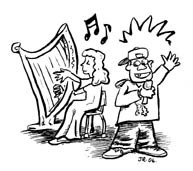ASK AN EXPERT
Accounting for musical taste
Q: Why do we like some music and not others?

A: Our musical tastes begin to form in the womb. By 12 weeks, the fetus has a completely functioning auditory system and is able to hear music through the amniotic fluid (it sounds something like listening under water). One-year olds show clear preferences for music that they heard in utero. Until roughly the age of eight, children absorb whatever music they hear, during the time when the brain is working hard to make billions of new connections.
Just as there are "critical periods" for language acquisition, there appear to be critical periods for the acquisition of music listening. As children hear music, they develop neural systems -— schemas — to capture the structural and tonal regularities of that music. Beginning around age 10, as the brain's mission shifts toward pruning out unused neural connections, musical tastes focus around the music we're used to. At about age 12, music begins to serve a social bonding function and we use music to distinguish our social group from others: this is the kind of music people like us listen to, that music is for them. As young teens, our musical tastes are further refined by what our friends are listening to. Most of us base our adult musical tastes on what we liked when we were 12 to16. In some cases, through effort, we can expand our musical tastes as adults. But if we had relatively narrow tastes in our developing years, this is more difficult to do because we lack the appropriate schemas, or templates, with which to process and ultimately to understand new musical forms.
Daniel Levitin, Associate Professor, Department of Psychology and the McGill Program in Behavioural Neuroscience, holds the Bell Chair in the Psychology of Electronic Communication. His book, This Is Your Brain On Music: The Science of a Human Obsession (Dutton/Penguin), has been a top 100 seller at Amazon since it came out last month.

